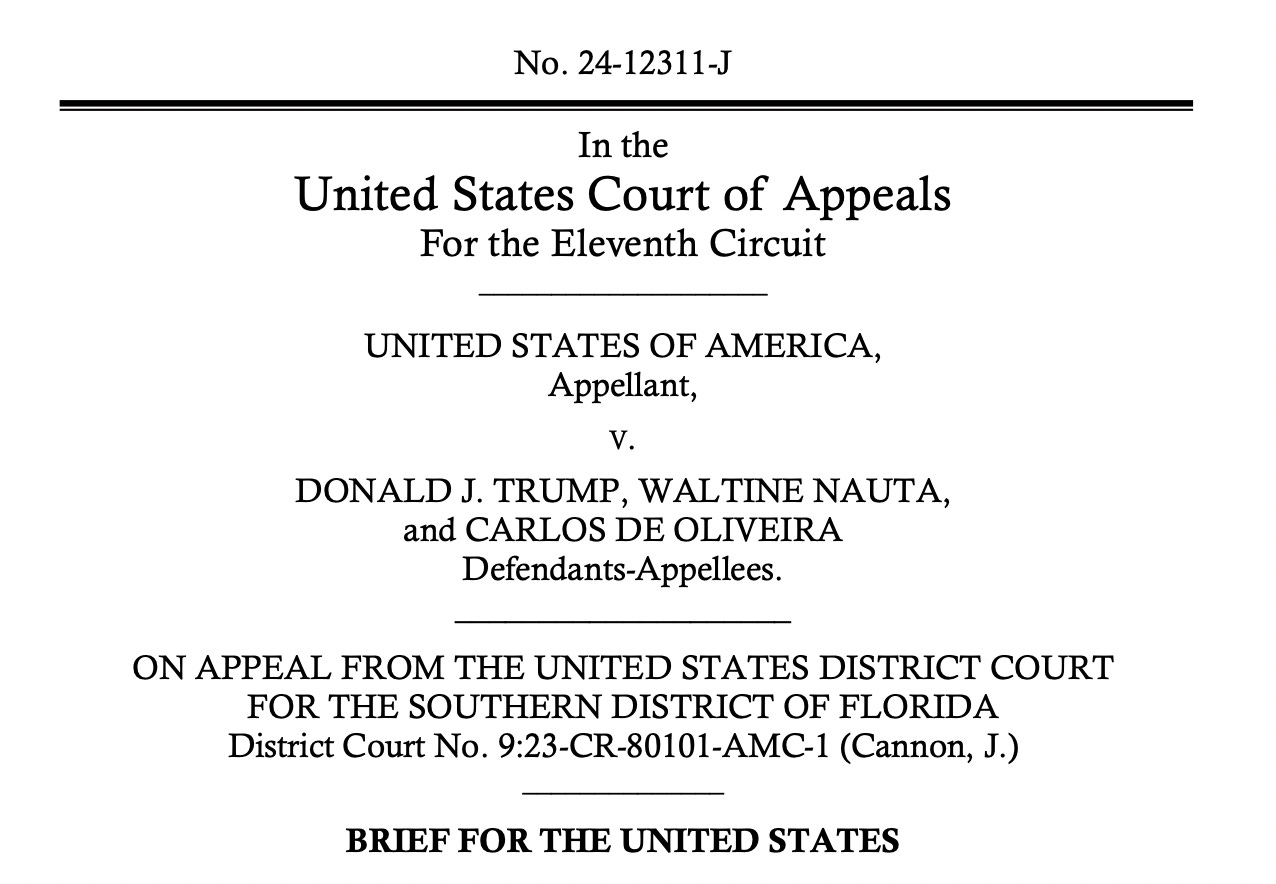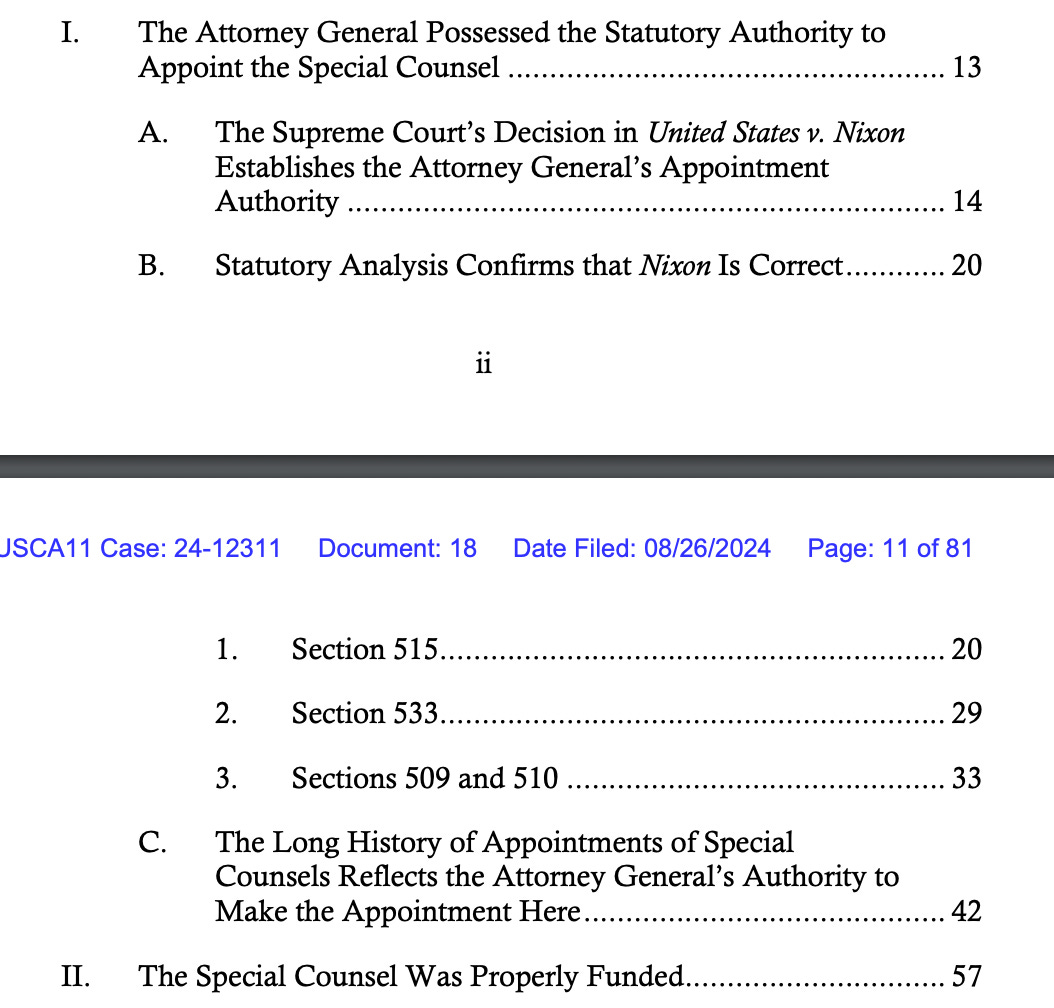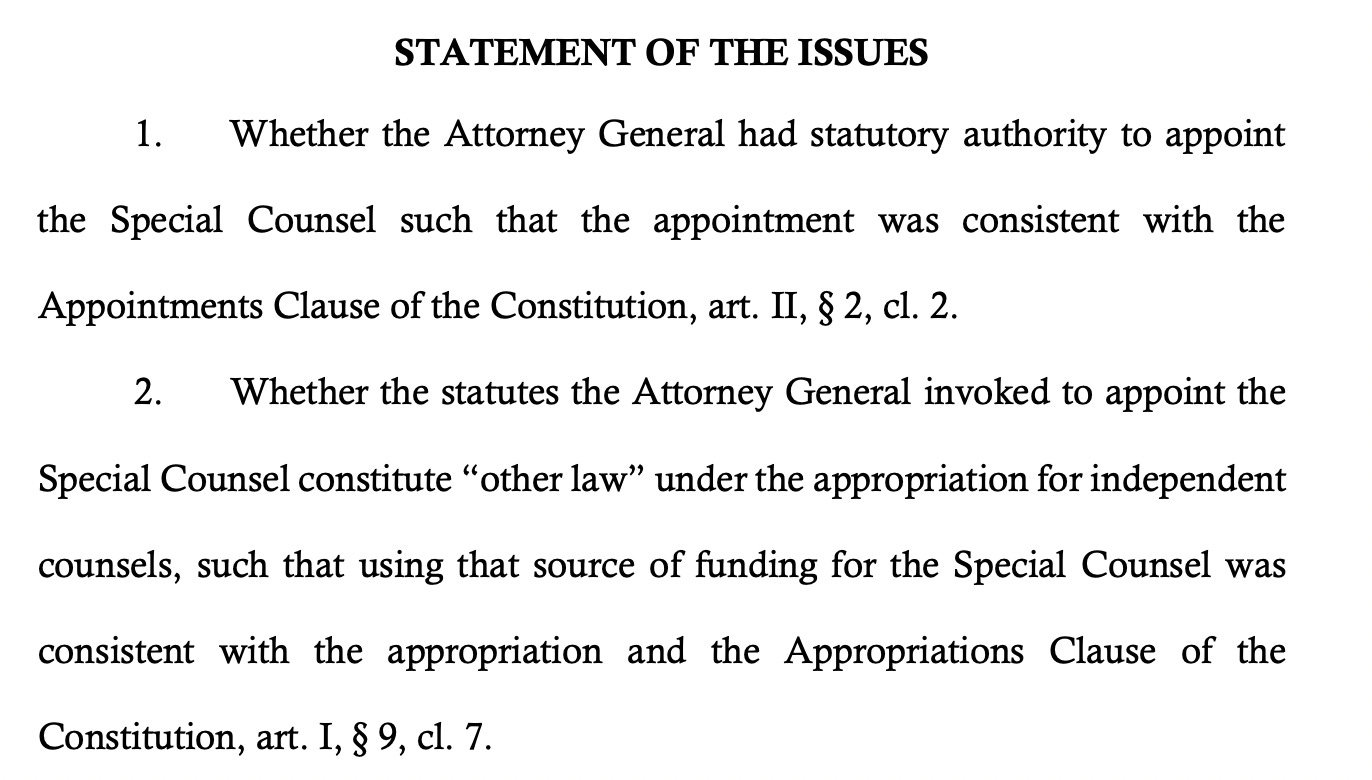Reading Jack Smith's Brief
Jack Smith's brief is in. Here are a few quick thoughts on what is in the brief, but perhaps of more interest is what isn’t included. Smith did not ask the court to reassign the case to another district judge on remand if he’s successful in the appeal. The ball is now in the 11th Circuit’s court.
The government asked for oral argument: No surprise here, and the court would likely ask the parties to appear before them to argue the case even without a request because the issue is both novel and important.
We get a good overview of the government’s key arguments in the table of contents. They argue that Attorney General Merrick Garland was authorized by law to appoint a special counsel to handle this matter and that the funding mechanism used to support the special counsel’s work was lawful. Those are the two key arguments Judge Cannon ruled in Trump’s favor on. The government’s position is that she got it badly wrong.
We get a formal statement of the issues the government believes are before the court. Lots of legalese here, but the formal issues are a reflection of the two arguments the government makes, that we’ve already identified in the table of contents.
The government’s recitation of what happened in front of Judge Cannon is pretty vanilla. They had the option of delving a little more deeply into just how poorly she handled the matter, but chose the high ground. The closest they come to taking a swipe at here is here, where they point out that although she examined the key precedential case, U.S. v. Nixon, and understood what it said, she decided to ignore it. Despite the neutral language they use, they land the strong criticism, in the polite language of appellate lawyers.
The summary of the argument is five and one-half pages long. This might not seem like a big deal in an important case, but the local rules in the Circuit suggest that: “It [the summary of the argument] should seldom exceed two and never five pages.” This is a Circuit that takes both its local rules and brevity seriously. Whether they will take Smith to task over half a page remains to be seen.
Here’s the meat of the argument: “The only question presented here is whether Congress has vested the Attorney General, by law with the power to make the appointment. The Supreme Court squarely answered that question in United States v. Nixon, 418 U.S. 683, 694 (1974), holding that the Attorney General has statutory authority under 28 U.S.C. §§ 509, 510, 515, and 533 to appoint a special prosecutor comparable to the Special Counsel. Id. at 694-95. Statutory text, context, and history confirm that Nixon was correct.” The government is saying that the Attorney General did what he was authorized to do by law, and that a prior decision of the Supreme Court confirms he did it correctly. It’s a strong argument.
They do a nice, not-so-subtle job of reminding the court of what it already knows, that following prior Supreme Court precedent isn’t optional. Judge Cannon is obligated to follow the law. “Where, as here, the Supreme Court has expressly addressed an issue, lower courts are bound to follow it. The district court’s treatment of Nixon departed from that foundational principle.”
Judge Cannon took the view that binding precedent was just “dicta,” a legal term for judicial language that isn’t essential to resolving a case, and therefore, need not be followed by subsequent courts. Judge Cannon’s reasoning here was mighty thin. The brief points out that the Court’s findings about the Attorney General’s ability to appoint a special counsel in Nixon was a necessary step it had to make in reaching its final decision in that case, so Judge Cannon was obligated to follow along. The Special Counsel concludes, “In sum, the district court erred in failing to treat Nixon’s conclusion—that Congress has authorized the Attorney General to appoint special counsels—as controlling. That conclusion was a binding holding, or, at least, authoritative dictum. Either way, Nixon conclusively defeats the defendants’ challenge to the Special Counsel’s appointment, as every other court to have considered the issue has found.”
The Special Counsel also points out that there are four separate statutes that authorize the action the Attorney General took — 28 U.S.C. §§ 509, 510, 515, and 533 — and that they “provide multiple independently sufficient grounds for the Special Counsel’s appointment.” In other words, the government doesn’t need to convince the 11th Circuit that all of them apply; just one will do. The brief points out that Judge Cannon misread the language and grammar of the statutes in order to reach her bad decision.
Referencing the Supreme Court’s recent reliance on history and tradition to decide what the law says, Jack Smith argues, in a subsection titled, “The Long History of Appointments of Special Counsels Reflects the Attorney General’s Authority to Make the Appointment Here,” that “For more than 150 years, Attorneys General have appointed special counsels to investigate and prosecute some of the nation’s most consequential cases. This “deeply rooted tradition of appointing an outside prosecutor to run particular federal investigations,” The Special Counsel cites to a 1998 Georgetown Law Journal article written by now-Supreme Court Justice Brett Kavanaugh, The President and the Independent Counsel, to support the lawfulness of the Special Counsel’s appointment. It’s a nicely constructed argument that asks the 11th Circuit to decide whether they think Aileen Cannon or Brett Kavanaugh has the more authoritative understanding of how the law on the appointment of special counsels works. The exhaustive discussion of the history of the use of special counsels makes clear that Jack Smith is properly in place and conducting this prosecution.
The Special Counsel also summarily takes apart Judge Cannon’s argument that his work isn’t properly funded, noting that “Because its premise [Cannon’s argument] was wrong, so was its conclusion.” She based her analysis on an “erroneous determination that no ‘other law’ supported the Special Counsel’s appointment.” The government argues that since they have conclusively established that the Special Counsel’s appointment was proper, the funding mechanism is also lawful.
That’s a very topline look at the Special Counsel’s brief. It’s long. The Circuit authorizes the opening brief in an appeal to have an argument of up to 13,000 words. This brief makes the limit, at 12,978 words. And the excellence of the argument—its thorough examination of the statutes, the case law, and the history of the appointment of special counsels—justifies going right up to the limit. This is the kind of brief that leaves no stone unturned. No longer in front of the very receptive Judge Cannon, Trump’s lawyers have a difficult path ahead of them in responding.
You can find the full brief here.
There is no request to expedite the proceedings in this case, which means that it will be early October before the briefing in this case is complete, unless the panel sets it for oral argument more quickly. There’s little reason for them to do that where the parties have not asked for it, which means it could be late this year or even after the first of the year before the case is argued. Without a request to expedite, it could also be some time before the panel issues its decision. The calendar is entirely up to the judges.
The smart money says Judge Cannon gets reversed, and this case gets back on track. But as we’ve seen, when it comes to Trump and the U.S. Supreme Court (where this matter is likely headed after the 11th Circuit is done with it), nothing is certain.
We’re in this together,
Joyce







The BLUF on this is that the court isn't going to save us before the election, but Smith has taken proper and deliberate action to be ready after the election. It is up to us, as voters, to ensure that he is allowed to proceed.
And thanks, as ever, Ms. Vance, for your clear, level-headed exposition of complex legal issues.
Why are the gloves still on? Is that a politic move? It’s straining every last piece of patience I have. He stole OUR docs and compromised OUR security.